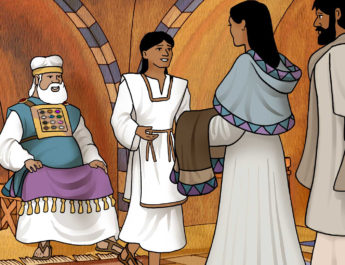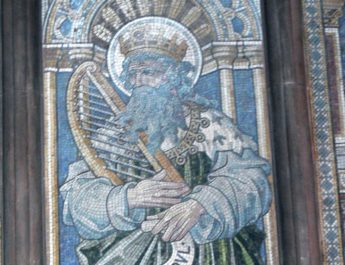Matthew 4:12-23
Third Sunday after Epiphany A
12 Now when Jesus heardA that JohnB had been arrested,C he withdrewD to Galilee.E
A “heard” = akouo. This is hear or listen, but it also means to understand by hearing. This is where the word “acoustics” comes from.
B “John” = Ioannes. From Hebrew yochanan (Johanan); from Yehochanan (“the Lord has been gracious”); {from YHVH (proper name of the God of Israel); {from havah (to become); from hayah (to be, exist, happen)} + chanan (beseech, show favor, be gracious; properly, to bend in kindness to someone with less status). This is John, meaning “the Lord has been gracious.”
C “arrested” = paradidomi. From para (from beside, by) + didomi (give, offer, place, bestow, deliver; give in a literal or figurative sense). This is literally to hand over – hence to deliver, abandon, or betray. It implies a personal involvement.
D “withdrew” = anachoreo. 14x in NT. From ana (up, again, back, among, anew) + choreo (to make space, receive, have room for, progress, depart so as to make room; figuratively, living open-heartedly); {from choros (a particular space or place); from chora (space, land, region, fields, open area); from chasma (gap, gulf, chasm, open space); from chasko (to gape, yawn)}. This is to withdraw, depart, retire, or leave. It can give a sense of seeking safety from harm or of retiring.
E “Galilee” = Galilaia. From Hebrew galil (cylinder, circuit, district); from galal (to roll in a literal or figurative sense, roll away, roll down, wallow, remove, trust). This is Galilee, meaning perhaps region or cylinder.
F “left” = kataleipo. From kata (down, against, throughout, among) + leipo (to leave behind, remain, lack, abandon, fall behind while racing). This is to leave or leave behind, abandon, forsake, leave in reserve.
G “Nazareth” = Nazareth. 12x in NT. Perhaps from netser (branch) OR from natsar (to watch, guard, protect). This is Nazareth, meaning perhaps branch or protected. It is a city in Galilee. See https://en.wikipedia.org/wiki/Nazareth
H {untranslated} = erchomai. This is to come or go.
made his homeI in CapernaumJ by the sea,K
I “made…home” = katoikeo. From kata (down, against, throughout, among) + oikeo (to settle or be established somewhere in a permanent way, to make a home or live at home); {from oikos (house – the building, the household, the family, descendants; the temple)}. This is to live or settle on a permanent basis.
J “Capernaum” = Kapernaoum. 16x in NT. From Hebrew kaphar (village with walls); {from the same as kephir (a young lion, village); from kaphar (to appease, cover, pacify, cancel)} + Nachum (Nahum, “comfortable”); {from nacham (a strong breath or sigh; to be sorry, to pity, console, comfort, or repent; also to comfort oneself with thoughts of vengeance)}. This is Capernaum, meaning “Nahum’s village.”
K “by the sea” = parathalassios. 1x in NT. From para (beside, by, in the presence of) + thalassa (sea, a lake, or seashore); {perhaps from hals (sea, salt, a boy of saltwater) or halas (salt; can be figurative for prudence)}. This is along the sea or coast.
in the territoryL of ZebulunM and Naphtali,N
L “territory” = horion. 12x in NT. From horos (limit, boundary). This is a boundary on land or a coast. It could be district, region, territory, or frontier.
M “Zebulun” = Zaboulon. 3x in NT. From Hebrew Zebulun (Zebulun, that tribe, or their territory; means “habitation”); from zabal (to dwell, inclose, reside). This is Zebulun, that tribe, or their territory. It means “habitation.”
N “Naphtali” = Nephthalim. 3x in NT. From Hebrew Naphtali (Naphtali, meaning “my wrestling”; Naphtali, his tribe, or the lands of the tribe); from pathal (to twist, twine, wrestle, struggle, behave in an unsavory way). This is Naphtali, meaning “my wrestling.” It can refer to Naphtali, his tribe, or the lands of the tribe.
14 so that what had been spoken through the prophetO IsaiahP might be fulfilled:Q, R
O “prophet” = prophetes. From pro (before, in front of, earlier than) + phemi (to declare, say, use contrasts in speaking to shed light on one point of view); {from phao (to shine) or phaino (to bring light, cause to appear, shine, become visible or clear)}. This is a prophet or poet – one who speaks with inspiration from God.
P “Isaiah” = Esaias. Related to “John” in v12. From Hebrew Yeshayahu (Isaiah, “salvation of the Lord”); {from yasha (to deliver, defend, help, preserve, rescue; properly, to be open, wide or free, which implies being safe; to free someone) + Yah (the shortened form of the name of the God of Israel; God, Lord); {from YHVH (see note B above)}}. This is Isaiah, meaning “salvation of the Lord.”
Q “fulfilled” = pleroo. From pleres (to be full, complete, abounding in, occupied with). This is to fill, make full or complete. Properly, this is filling something up to the maximum extent that it can be filled – an appropriate amount for its individual capacity. So, this is used figuratively for furnish, influence, satisfy, finish, preach, perfect, and fulfill.
R {untranslated} = lego. This is to speak, say, name, call, command. It is generally to convey verbally.
15 “LandS of Zebulun, land of Naphtali,
on the roadT by the sea,U across the Jordan,V Galilee of the gentilesW—
S “land” = ge. This is earth, land, soil, region, country, the inhabitants of an area.
T “road” = hodos. This is way, road, path, or journey. It can imply progress along a route.
U “sea” = thalassa. Related to “by the sea” in v13. See note K above. Perhaps from hals (see note K above) or halas (see note K above). This is the sea, a lake, or seashore.
V “Jordan” = Iordanes. 15x in NT. From Hebrew yarden (Jordan river, meaning “descending”); from yarad (to go down, descend; going down in a literal or figurative sense; going to the shore or a boundary, bringing down an enemy). This is the Jordan River, meaning “descending.”
W “gentiles” = ethnos. Probably from etho (a custom or culture). This is people who are united by having similar customs or culture. Generally, it is used to refer to Gentiles. This is a tribe, race, nation, or Gentiles in general. This is where the term “ethnicity” comes from.
16 the peopleX who satY in darknessZ
X “people” = laos. This is the people or crowd – often used for the chosen people. This is where the word “laity” comes from.
Y “sat” = kathemai. From kata (down, against, throughout, among) + hemai (to sit). This is to sit, be enthroned, or reside.
Z “darkness” = skotia. 16x in NT. From skotos (darkness literal or figurative – as moral or spiritual darkness, sin and what comes from it; obscurity); from skia (shadow, thick darkness, outline; figurative for a spiritual situation that is good or bad). This is darkness or dimness. Figuratively, it can be a spiritual darkness. This is obscurity in a literal or figurative sense.
have seenAA a greatBB light,CC
AA “seen” = horao. To see, perceive, attend to, look upon, experience. Properly, to stare at and so implying clear discernment. This, by extension, would indicate attending to what was seen and learned. This is to see, often with a metaphorical sense. Can include inward spiritual seeing.
BB “great” = megas. This is big in a literal or figurative sense – great, large, exceeding, abundant, high, mighty, perfect, strong, etc.
CC “light” = phos. Related to “prophet” in v14. From phao (see note O above); from the same as phaino (see note O above). This is light, a source of light, fire, or radiance. This is light with specific reference to what it reveals. It is luminousness whether natural or artificial, abstract or concrete, literal or figurative.
and for those who sat in the regionDD and shadowEE of deathFF
light has dawned.”GG
DD “region” = chora. Related to “withdrew” in v12. See note D above.
EE “shadow” = skia. Related to “darkness” in v16. 7x in NT. See note Z above.
FF “death” = thanatos. From thnesko (to die, be dead). This is death, whether literal or spiritual. It can also refer to something that is fatal.
GG “dawned” = anatello. 9x in NT. From ana (up, again, back, anew) + tello (to cause to arise); {from telos (an end, aim, purpose, completion, end goal, consummation, tax)}. This is rise, shine, or dawn. It is most often used of the sun. Figuratively, it can mean achieving a goal or reaching consummation after completing the needed steps.
17 From that time JesusHH beganII to proclaim,JJ, KK
HH “Jesus” = Iesous. Related to “John” in v12 & “Isaiah” in v14. From Hebrew Yehoshua (Joshua, the Lord is salvation); {from YHVH (see note B above)} + yasha (to deliver, defend, help, preserve, rescue; properly, to be open, wide or free, which implies being safe. So, in a causative sense, this is to free someone)}. This is Jesus or Joshua in Greek – the Lord saves or the Lord is salvation.
II “began” = archomai. From archo (to rule, begin, have first rank or have political power). This is to begin or rule.
JJ “proclaim” = kerusso. This is to proclaim, preach, publish. Properly, it is to act as a herald – announcing something publicly with confidence and/or to persuade.
KK {untranslated} = lego. Same as {untranslated} in v14. See note R above.
“Repent,LL for the kingdomMM of heavenNN has come near.”OO
LL “repent” = metanoeo. From meta (with, among, after, beyond) + noieo (to perceive, think, understand); {from nous (mind, understanding, reasoning faculty, intellect, capacity to reflect)}. This is to
MM “kingdom” = basileia. From basileus (king, emperor, sovereign); probably from basis (step, hence foot; a pace); from baino (to walk, to go). This is kingdom, rule, authority, sovereignty, royalty, a realm.
NN “heaven” = ouranos. May be related to oros (mountain, hill); probably related to airo (raise, take up, lift, remove). This is the air, the sky, the atmosphere, and heaven. It is the sky that is visible and the spiritual heaven where God dwells. Heaven implies happiness, power, and eternity.
OO “come near” = eggizo. From eggus (nearby or near in time). This is extremely close by – approaching, at hand, immediately imminent.
18 As he walkedPP by the Sea of Galilee, he saw twoQQ brothers,RR
PP “walked” = peripateo. From peri (about, concerning, around, encompassing) + pateo (to read, trample on; to trample literally or figuratively); {from patos (trodden) OR from paio (to strike, smite, sting; a hit like a single blow)}. This is to walk. Going from Hebrew figurative language, to walk referred to how you conducted your life, how you chose to live. This word is most literally walking around. Figuratively, it is living, behaving, following, how you occupy yourself. This is where “peripatetic” comes from.
QQ “two” = duo. This is two or both.
RR “brothers” = adelphos. From a (with, community, fellowship) + delphus (womb). This is a brother in a literal or figurative sense. It is also used of another member of the Church.
Simon,SS who is calledTT Peter,UU
SS “Simon” = Simon. From Hebrew Shimon (Simon – Jacob’s son and his tribe); from shama (to hear, often implying attention and obedience). This is Simon, meaning “he who hears.”
TT “called” = lego. Same as {untranslated} in v14. See note R above.
UU “Peter” = Petros. Related to petra (large rock that is connected and or projecting like a rock, ledge, or cliff; can also be cave or stony ground). This is Peter, a stone, pebble, or boulder.
and AndrewVV his brother, castingWW a netXX into the sea—for they were fishers.YY
VV “Andrew” = Andreas. 13x in NT. From aner (man, male, sir, husband). This is Andrew, meaning manly.
WW “casting” = ballo. This is to throw, cast, rush, place, or drop. It is throwing, but it could be with more or less velocity and with more or less force/violence.
XX “net” = amphiblestron. Related to “casting” in v18. 1x in NT. From amphoteros (both, all); {from ampho (on both sides, around)} + ballo (see note WW above). This is properly a thing that is thrown around. Used specifically to describe a drag net style of fishing net.
YY “fishers” = halieus. Related to “by the sea” in v13 & “sea” in v15. From hals (see note K above). This is a sailor, which implies fishermen. The term is used for those who fish on saltwater and freshwater.
19 And he saidZZ to them, “FollowAAA, BBB me, and I will makeCCC you fishers of people.”DDD
ZZ “said” = lego. Same as {untranslated} in v14. See note R above.
AAA “follow” = deute. 12x in NT. From deuro (come here, hither, hence, now, until now). This is come, follow – as an exclamatory mood.
BBB {untranslated} = opiso. Related to “seen” in v16. From the same as opisthen (after, back, from the rear); probably from opis (back); from optanomai (to appear, be seen); perhaps from horao (see note AA above). This is back, behind, after.
CCC “make” = poieo. This is to make, do, act, construct, abide, or cause.
DDD “people” = anthropos. Related to “Andrew” in v18 & “seen” in v16 & {untranslated} in v19. Probably from aner (see note VV above) + ops (eye, face); {from optanomai (see note BBB above)}. This is human, humankind. Used for all genders.
20 ImmediatelyEEE they leftFFF their netsGGG and followedHHH him.
EEE “immediately” = eutheos. From euthus (immediately, upright, straight and not crooked); {perhaps from eu (good, well, well done, rightly) + tithemi (to place, lay, set, establish)}. This is directly, soon, at once.
FFF “left” = aphiemi. From apo (from, away from) + hiemi (to send). This is send away, release, permit, forgive, allow to depart, discharge, or send forth.
GGG “nets” = diktuon. 12x in NT. From dikein (to cast); probably from diko (to cast). A fishing net or any net used in hunting.
HHH “followed” = akoloutheo. From a (with, fellowship, union) + keleuthos (road, way). This is to accompany or follow someone, especially the way a disciple does.
21 As he wentIII from there, he saw two otherJJJ brothers, JamesKKK
III “went” = probaino. Related to “kingdom” in v17. 5x in NT. From pro (before, ahead, earlier than, above) + the same as basis (see note MM above). This is to go forward literally or to advance in years.
JJJ “other” = allos. This is other, another. Specifically, it is another of a similar kind or type. There is a different word in Greek that speaks of another as a different kind (heteros).
KKK “James” = Iakobos. From Hebrew Yaaqob (Jacob); from the same as aqeb (heel, hind part, hoof, rear guard of an army, one who lies in wait, usurper). This is James, meaning heel grabber or usurper.
son of ZebedeeLLL and his brother John, in the boatMMM with their fatherNNN Zebedee,
LLL “Zebedee” = Zebedaios. Related to “John” in v12 & “Isaiah” in v14 & “Jesus” in v17. 12x in NT. From Hebrew zebadyah (Zebadiah, “The Lord has bestowed”); {from Zabad (to bestow, confer, endure) + Yah (see note P above)}. This is Zebedee, meaning “the Lord has bestowed.”
MMM “boat” = ploion. From pleo (to sail, voyage); probably from pluno (to plunge – so to wash); from pluo (to flow). This is a boat, ship, or vessel.
NNN “father” = pater. This is father in a literal or figurative sense. Could be elder, senior, ancestor, originator, or patriarch.
mendingOOO their nets,PPP and he calledQQQ them. 22 Immediately they left the boat and their father and followedRRR him.
OOO“mending” = katartizo. 13x in NT. From kata (down, against, throughout, among) + artizo (get ready, prepare); {from artios (perfect, complete, ready, adequate, fitted); from arti (now, in the moment); from airo (raise, take up, lift, remove)}. This is to prepare, complete, perfect for final use. This is restoring something to a good condition, whether for the first time or one more. It is to repair in a literal or figurative sense.
PPP“nets” = diktuon. Same as “nets” in v20. See note GGG above.
QQQ “called” = kaleo. Related to keleuo (to command, order, direct); from kelomai (to urge on). This is to call by name, invite, to name, bid, summon, call aloud.
RRR “followed” = akoloutheo. Same as “followed” in v20. See note HHH above.
23 Jesus wentSSS throughout allTTT Galilee, teachingUUU in their synagoguesVVV and proclaiming the good newsWWW of the kingdom
SSS “went” = periago. 6x in NT. From peri (about, concerning, all around, encompassing) + ago (lead, bring, carry, drive, go). This is to lead around, compass, go about.
TTT “all” = holos. This is whole, complete, or entire. It is a state where every member is present and functioning in concert. This is the root of the word “whole.”
UUU “teaching” = didasko. From dao (learn). This is to teach, direct, instruct, or impart knowledge. In the New Testament, this is almost always used for teaching scripture.
VVV “synagogues” = sunagoge. Related to “went” in v23. From sun (with, together with, closely associated) + ago (see note SSS above). Literally, this is a bringing together, a place of assembly. The term can be used for the people or for the place where they assemble. It is also sometimes used of Christian churches in the New Testament. So, this is synagogue, assembly, congregation, or church. This is where the word “synagogue” comes from.
WWW “good news” = euaggelion. Related to “went” & “synagogues” in v23 & “immediately” in v20. From eu (see note EEE above) + aggelos (angel, messenger; a messenger from God bringing news – whether a prophet or an angel); {from aggellos (to bring tidings); probably from ago (see note SSS above)}. This is literally “the good news,” used for the gospel. This is also where “evangelism” comes from.
and curingXXX everyYYY diseaseZZZ and every sicknessAAAA among the people.BBBB
XXX “curing” = therapeuo. From therapon (servant, attendant, minister); perhaps from theros (properly heat and so used for summer); from thero (to heat). This is to serve, care, attend, heal, or cure. Since it means to attend to, it can be used for doctors, but also for those who serve God. So, it can mean worship. This is where the word “therapy” comes from.
YYY “every” = pas. This is all or every.
ZZZ “disease” = nosos. 11x in NT. This refers to a disease that is chronic and enduring. It can also be used for a moral failing.
AAAA “sickness” = malakia. 3x in NT. From malakos (soft, delicate). This is softness, weakness, or illness. It is some kind of condition that leaves the sufferer feeling weaker. It can also be a disabling condition.
BBBB “people” = laos. Same as “people” in v16. See note X above.
Image credit: “Sea of Galilee: Fish and Fishing Nets” by LUMO Project.




